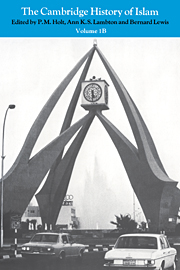Book contents
- Frontmatter
- Introduction
- Part IV The central Islamic lands in recent times
- 1 Modern Turkey
- 2 The Arab lands
- 3 Modern Persia
- 4 Islam in the Soviet Union
- 5 Communism in the central Islamic lands
- 6 The Political impact of the West
- 7 Economic and social change
- Dynastic lists
- Bibliography
- Glossary
- Index
- References
6 - The Political impact of the West
from Part IV - The central Islamic lands in recent times
Published online by Cambridge University Press: 28 March 2008
- Frontmatter
- Introduction
- Part IV The central Islamic lands in recent times
- 1 Modern Turkey
- 2 The Arab lands
- 3 Modern Persia
- 4 Islam in the Soviet Union
- 5 Communism in the central Islamic lands
- 6 The Political impact of the West
- 7 Economic and social change
- Dynastic lists
- Bibliography
- Glossary
- Index
- References
Summary
The world, the West, and Islam
The impact of the West on the rest of the world has been the most striking feature of human history in the last five hundred years. It acquired its dynamic force, ultimately, from a new attitude of mind—an avid dedication to the exploration of the unknown, an appreciation of continuity in change and of unity in variety, and a restless ambition to convert knowledge into power. This new mental outlook resulted in the progressive control of man's natural environment by means of an ever vaster and tighter division of human labour. The Western impact has been an impact of modern science, of modern technology, and of modern forms of social organization; its channels of transmission have been improved means of transport, more powerful weapons, and the desire of non-Western peoples to emulate the patterns of civilization whose effectiveness had thus been demonstrated.
This world-wide Western impact took three principal forms: overseas settlement, colonial rule and what has been called defensive modernization. The Americas were the first continent to succumb to colonial conquest; much of the indigenous population was replaced by European immigrants, whose descendants took the lead in establishing the first post-colonial states. Australia and New Zealand followed a similar course, although for them, as for Canada, independence came as the result of more gradual evolution. Today, the countries of North and South America may be considered cultural offshoots of the West, with a strong admixture of indigenous elements mainly in the Andean region from Mexico to Bolivia.
- Type
- Chapter
- Information
- The Cambridge History of Islam , pp. 673 - 697Publisher: Cambridge University PressPrint publication year: 1977



